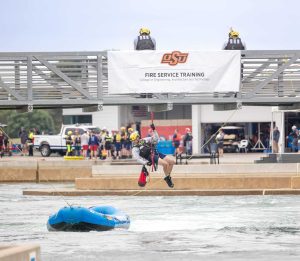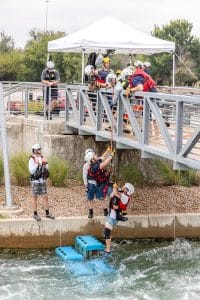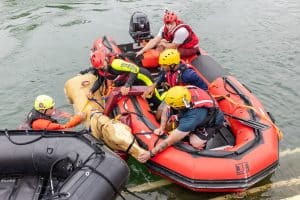
okstatenews
(OKLAHOMA CITY, Sept. 5, 2025) — Water rescues occur nearly every day in Oklahoma, where flash flooding is a recurring hazard and one of the deadliest severe weather threats. According to the National Weather Service, flash floods claim more than 100 lives annually in the United States and often place first responders themselves at significant risk.
Between 2000 and 2018, at least 300 rescuers lost their lives in U.S. water rescue operations, many in swiftwater environments.
That reality is what brought first responders from across the nation and around the world to Oklahoma City, where Oklahoma State University’s College of Engineering, Architecture and Technology’s Fire Service Training program recently hosted the 2025 Oklahoma Swiftwater Rescue Conference & Competition.
This event provides a rare and essential opportunity for first responders to train for one of the most dynamic and dangerous emergencies they face, equipping them with the tools, decision-making skills and real-world practice they need to conduct rescues safely.
Held annually since 2022, the conference is recognized as one of the premier swiftwater rescue training events in the world.
“This is the largest training facility for swiftwater rescue in the country,” said Riki Manley, FST business operations specialist. “This year’s event had a record number of participants from 11 different states, as well as international attendees from New Zealand.”
The event combines classroom instruction, hands-on exercises and a final-day competition designed to test skills under pressure in the nation’s top swiftwater training facility, RiverSport OKC, which can simulate up to class five rapids.
“This facility gives us the ability to train in ways that are as close to real-world flooding as possible, but in a safe environment where mistakes become lessons instead of tragedies,” said Matt Bell, program manager for the Oklahoma Task Force 1, Tulsa Urban Search & Rescue Team and rescue coordinator for the Tulsa Fire Department.
The 2025 program included workshops on progressive rescue techniques, boat operations, vehicle extractions in moving water, animal rescue, incident command, rescue swimmer skills and more.
“In Hurricane Katrina, it flooded so badly that people would go up into their attics,” Manley said. “They wouldn’t evacuate. They just wouldn’t leave their homes. They would go up in the attic, and then they couldn’t get out. So, the rescue teams were going house to house, cutting into attics to search for people. And so, we brought the attic prop into this year’s training.”
Instruction is led by emergency responders with direct experience in major hurricanes, floods and disaster deployments, ensuring participants learn methods proven in the field.
Greg Merrell is the lead technical rescue and water rescue instructor for FST. Merrell is a Battalion Chief for the Oklahoma City Fire Department, who he has been with for 23 years. He is a task force leader for OK-TF 1, OKC Urban Search & Rescue Team. In addition to being a former U.S. Army Blackhawk helicopter pilot, he is also a swiftwater rescue technician & rescue boat instructor and a public safety diver. Merrell determines what stations will be provided at the conference and who will teach them.
“We carefully vet our instructors because we want professionals who are actively working in the field,” Merrell said. “This ensures the skills they teach are realistic and allows them to share practical insights from their own experience. They can anticipate hazards or challenges students might face because they’ve encountered them firsthand. Our instructors come from across the country, including the West Coast, East Coast, and the central U.S., to provide a well-rounded perspective. No single person knows everything, so having diverse experiences enriches our students’ learning and brings additional skills to our program.”
The importance of this training goes beyond technical skill. First responders must weigh risks to victims and rescuers, evaluate environmental conditions and rely on split-second judgment in rapidly changing waters. By practicing these scenarios in a controlled but realistic environment, participants gain the ability to carry lessons back to their communities.
A highlight of the event for attendees is the Higgins and Langley Awards presentation. These awards were established in 1993 to honor two men who valiantly lost their lives in rescue efforts: Earl F. Higgins, who died in 1980 and Jeffrey Langley, who died in 1993.
The awards recognize preparedness, teamwork and a job performed often under extreme conditions where training is vital to the success of the rescue mission and the safety of rescue personnel.
Phil Miller, chairman of the Higgins and Langley awards, attended the conference. The organization gives 7 to 10 awards annually, and several recipients were in attendance, including one from New South Wales Fire in Australia and Christchurch, New Zealand.
With participants ranging from firefighters and EMS professionals to urban search and rescue teams and law enforcement agencies, the conference also fosters collaboration among emergency responders. Attendees share strategies, innovations and lessons learned, creating stronger networks that extend far beyond the week-long training.
Through the Swiftwater Rescue Conference & Competition, OSU is fulfilling its land-grant mission by equipping first responders to protect their communities, conserve resources and build resilience in the face of disasters.
Oklahoma State University, as a land-grant institution, promotes learning, advances knowledge and serves the state, nation and world through teaching, research and outreach. OSU has more than 36,000 students across its statewide system and offers more than 200 undergraduate and graduate degree programs.
- okstatenews
- okstatenews







